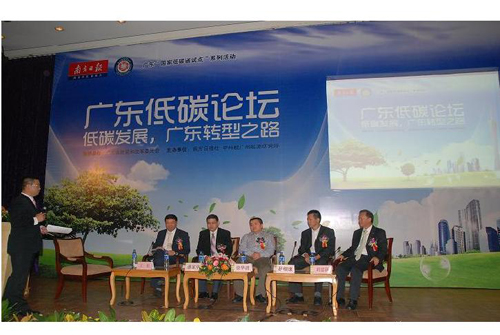Guangdong low-carbon forum --- low-carbon development, Guangdong’s transition road

August of 2010, china officially launched “national low-carbon province and low-carbon city experimental project”.Guangdong province became one of the first pilot provinces to take up low-carbon development task one step ahead under reform and opening-up policy.
In order to get better integration of supports to explore low carbon development path for Guangdong and to speed up the transformation of economic development mode, Guangzhou Institute of Energy Conversion of Chinese Academy of Sciences jointly with Nan Fang Daily hereby scheduled “Guangdong low-carbon forum --- low-carbon development, Guangdong’s transition road” on Nov 2nd, 2010. Forum invited government officials, experts of research institutes and representatives of enterprises together to pool the wisdom of the parties and exchange ideas about the low-carbon development in Guangdong.
In the forum, Deputy Director of Guangdong DRC Mr Lu Xiulu represented government to give an opening remark. He emphasized that carry out basic researches and works for low carbon development was the primary step, including preparation of Guangdong low-carbon development strategy in “the 12th Five Year Plan”, the investigation to build GHG emission statistic systems and monitoring systems, the establishment of evaluation and assessment systems for low carbon development, the development of carbon trading trial projects and carbon labeling research works and so on.
In addition, Guangdong should also promote industrial development in low carbon direction, optimize the energy structure to increase energy efficiency and energy conservation, develop low-carbon transport system and low carbon construction as well as other 30 emphasized projects to build Green Guangdong.
In order to enhance the cooperation between China and UK under low carbon economics development, Mr. Tim Hanson, the consular of Climate Change and Energy Department of British Consulate General in Guangzhou attended the Forum. Two years ago, British Consulate General in Guangzhou and Guangzhou Institute of Energy Conversion jointly launched the “Guangdong Low Carbon Economy Roadmap” project. This project reflects the cooperation between UK and China on climate change and low carbon economic development issues.
The Leader of “Guangdong Low Carbon Economy Roadmap”, deputy director of Guangzhou Institute of Energy Conversion and the director of energy strategy center of GIEC, Dr Zhao Daiqing gave a speech as a representative of experts and scholars. She pointed out: the carbon productivity of Guangdong was higher than the national average level, which made Guangdong have a good foundation to take low carbon transform. From an international point of view, Guangdong’s carbon productivity was still high comparing with other developed countries. “Energy conservation and GHG emission reduction actions should focus on industrial power supply sectors, transportation and construction sectors.”
Guangdong should establish regime and security system for low-carbon development. Guangdong should place emphasis on the adjustment of industrial structures and optimization of energy structure as well as to build relative taxation and finance, policy and evaluation systems. Guangdong could promote Contract Energy Management mechanism and carry out carbon trading, energy tax and carbon tax in national and provincial level. Guangdong may develop low-carbon trial programs to popularize the concepts of sustainable development and low-carbon consumption pattern. For innovative technologies, Guangdong should establish the promotion mechanisms for technology industry and should protect intellectual property. We should achieve the cooperation between governments, research institutes and industries to build up the assessment mechanisms for energy consumption and carbon emission reduction statistics and provide low-carbon development funds as soon as possible.
Director of Institute for Urban Development and Environmental Studies, Chinese Academy of Social Sciences Dr Pan Jiahua expressed that low carbon development requires oriented leading and empowerment. Low carbon development should be carried out continuously and make efforts step by step. He emphasized that, without the participation of the whole society and the voluntary actions, low carbon can only be worthless.
Director of Energy, Environment and Climate Change Center of NDRC Dr Xu Huaqing’s speech focused on the national development. He raised 4 points for implementations to promote low-carbon development, which were government-led forces, business execution, market allocation and social synergy.
One of representatives from enterprises, the CEO of Guangdong Mingyang Wind Power Group Mr Wang Song brought the words that enterprise required government to switch on the low carbon market through industrial policies in order to bring development opportunities for companies.
The deputy general manager of China Merchants Property Development Co.,Ltd Mr Hu Jianxin believed that the physical building requires financial inputs, but energy conservation would be achieved through better designs and operation.
The chairman of a clean energy supplier Jiu Feng Group Mr Zhang Jianguo indicated that, under low-carbon development constraints, a lot of enterprises were facing emission reduction. Many enterprises had asked Jiu Feng for energy conservation solutions. Learnt by experience, Jiu Feng decided to build up low-carbon technology Demonstration Park to provide customized energy conservation solution for enterprises.
Deputy General Manager of China Travel Service Group Mr Guo Xinggang introduced the tourism industry which, as a modern service industry, it consumed less resource, had low pollution and was characterized by low GHG emissions. These characteristics determined tourism industry have development advantage in low-carbon economy. He said Tourism Industry Park was an effective carrier and was the new pattern of innovative tourism industry.
The forum ended in relaxed and open discussions. No matter in the aspect of government policy implementation and academic point of research institutions or from the experience of corporations, the Forum revealed for public a very comprehensive and promising low-carbon development prospect of Guangdong. It also gathered valuable points and experience for future low-carbon transition of Guangdong.
